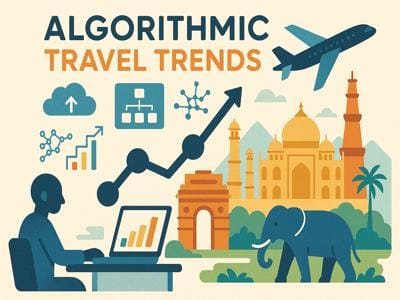Algorithmic Travel Trends India

How Algorithms Are Redefining Travel Choices in India?
In the digital age, the way we choose travel destinations has undergone a significant transformation. Algorithms and social media platforms now play a pivotal role in influencing our travel decisions, often dictating where we go, what we see, and how we experience new places.
The Rise of Algorithmic Tourism
Algorithmic tourism refers to the phenomenon where digital algorithms, primarily from social media and travel platforms, guide travelers’ choices. These algorithms analyze user behavior, preferences, and trends to suggest destinations and experiences. While this personalization can enhance convenience, it also raises concerns about homogenized travel experiences.
For instance, in Fort Kochi, Kerala, local businesses have observed a shift in tourist behavior. Travelers increasingly rely on online recommendations, leading them to frequent the same popular spots, while overlooking lesser-known local gems. This pattern has economic implications for businesses that fall outside the algorithm’s spotlight.
Social Media’s Influence on Travel
Social media platforms like Instagram and Facebook have become significant influencers in travel planning. Visual content, hashtags, and influencer posts shape perceptions and aspirations, often creating viral travel trends. Destinations like Varkala in Kerala have seen a surge in popularity due to increased social media mentions, transforming them into travel hotspots.
However, this influence can lead to over-tourism in certain areas, while other equally deserving destinations remain underexplored. The emphasis on capturing ‘Instagram-worthy’ moments may also detract from authentic travel experiences.
The Role of AI and Machine Learning
Artificial Intelligence (AI) and machine learning technologies are increasingly integrated into the travel industry. These technologies enable personalized recommendations, dynamic pricing, and efficient itinerary planning. For example, AI-powered pricing strategies allow travel companies to adjust rates in real-time based on demand and user behavior, optimizing both occupancy and profitability.
While these advancements offer benefits, they also raise ethical considerations. Concerns about data privacy, algorithmic bias, and the potential loss of spontaneous exploration are pertinent. It’s essential for the industry to balance technological innovation with ethical practices to ensure fair and enriching travel experiences.
Embracing Responsible Travel
As travelers, being aware of the influence of algorithms on our choices is crucial. Seeking information beyond algorithm-driven recommendations can lead to more diverse and authentic experiences. Engaging with local communities, exploring offbeat paths, and making conscious travel decisions contribute to sustainable tourism and support local economies.
In conclusion, while technology has undeniably enhanced the convenience of travel planning, it’s important to remain mindful of its influence. By combining digital tools with conscious choices, travelers can enjoy personalized experiences without compromising the richness and diversity that travel has to offer.
